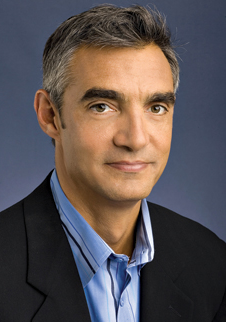Peter Liguori didn't mention me by name, but within the opening minutes of his town hall meeting with Tribune Co. employees Wednesday, he did refer to "the elephant in the room."
The pachyderm in question was the fallout from my report last week that the Tribune Co. CEO had ordered executives to come up with $100 million in budget cuts on the publishing side as the company prepares to spin it off from the broadcast side. Liguori called the number "illogical," but failed to offer anything more specific.
My sources for the story were individuals who attended a meeting at which the goals were set. A followup story in the Chicago Tribune also cited plans "to offset a projected revenue decline of $75 million to $100 million."
Nevertheless, Liguori tried to assure employees assembled in a studio at WGN-TV (and others who tuned in around the country) that there was no fixed target for budget cuts or layoffs. At the same time, he reiterated the company line that "everything's on the table" when it comes to the ongoing budget review.
"We’re not walking around with a very specific number in mind," he said. "But it is a process, and I don’t want to back into any specific number. I want to back into where I can drive forward toward the most functional group we can that creates the best papers on the planet."
In the end, employees came away with no clearer idea of how their jobs will be affected than before. (But they did get to hear Liguori banter with Arsenio Hall, host of Tribune Broadcasting's new late-night talk show, who appeared by satellite from Los Angeles.)
The one question that came from the floor challenged Liguori on how the company could continue to slash expenses in the publishing unit without affecting the quality of journalism.
"To date there’s been something like $800 million in cuts," Liguori said, to offset a loss of $1 billion in print advertising over the past few years. But setting a specific goal now would be "illogical," he said, adding: "If we just go for a number, we’re going to be backing in, and I worry that meeting a number on a page might be cutting too close to the bone, might rob us from vitality, might rob us from potential upside. So what we do is in the entire planning process — and each division may have different numbers that they’re starting out with — but overall what we’ll do in the budget process is look at the functionality of the business.
"My goal this budget year is not to put us in a position that for the next 12 months we’re going to be fine. My goal is to put us in a position where we can see a clear path in the midterm, in the next three years. And to know that the business engine is fine and lubricated and efficient. If we’re doing that and continuing to produce a good quality newspaper, we think we’re going to be vital for the longer term."
Liguori said the company was forging ahead with plans to spin off the publishing unit into a separate entity. By the end of the year, he said, he hoped to be able to release a Form 10 (financial data required by the Securities and Exchange Commission) that would begin the three-to-six-month process of forming a new company. After that, a new board of directors would be named and a new CEO would be appointed.
Steven Berns, the new chief financial officer for Tribune Co., wasn't any more specific than Liguori in preparing employees for what it will mean for them.
"The team is working on the publishing business to be a stand-alone business. In order to be a stand-alone business, it needs to be a profitably growing business. Profits can’t come from cost cuts alone," Berns said. "We face a number of choices to offset [the decline] in the publishing business. What we want to do is make sure we make some of those choices and we reinvest in the growth of the business. That’s the effort that we’re going through now."


